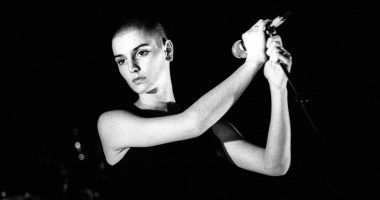LONDON — They’re maligned in the United States as rats with wings. Those pesky birds gobbling up trash and harassing people for treats in city streets and parks.
But in the United Kingdom, pigeons hold a more respected position as accomplished racers and little-known favorites of Queen Elizabeth II.
Yes, pigeons.
Long before the queen became Britain’s longest reigning monarch, the young princess took a keen interest in animals of all shapes and sizes, including pigeons, horses and, of course, corgis.
She was also an avid sportswoman, often pictured angling in Scotland with Prince Philip or driving herself to the horse stables at Sandringham Estate. Her trademark printed headscarves, tweeds and galoshes used on hunting, shooting and fishing expeditions were as recognizable as her handbags.
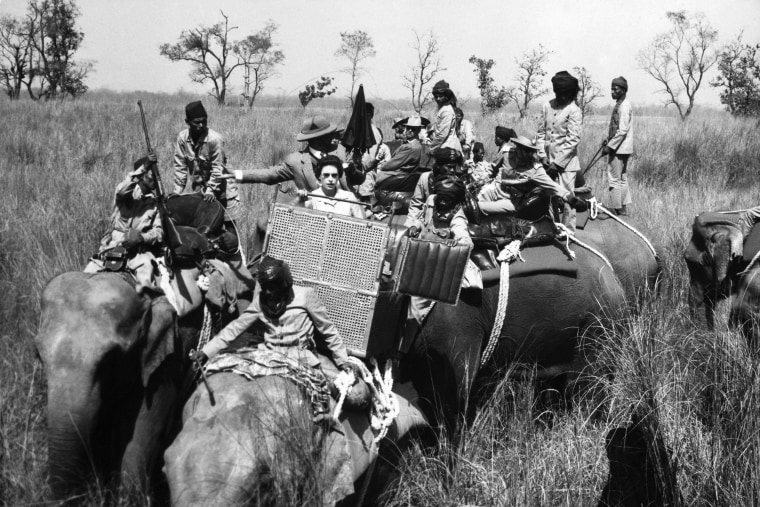
Still, her interest in animals was not without controversy. In 1961, she infamously posed with her husband and the Maharaja and the Maharani of Jaipur if front of a tiger killed by Prince Philip. The practice has since been banned in India.
The queen was, of course, most famously known for her love of dogs and owned more than 30 corgis and dorgis — Dachshund and Welsh Corgi hybrids — over her lifetime, according to the official royal website.
The dogs became synonymous with the crown and have been immortalized in countless photos, videos and even an animated movie. They were frequent fliers with the queen, nearly upstaging her in a 2016 photo shoot by the famed American photographer Annie Leibovitz, who reposted one of the images shortly after the queen’s passing.
For her 18th birthday, Elizabeth was given a corgi named Susan, who went on to breed more corgis, according to the official royal website. Some corgis were crossbred with dachshunds, including Pipkin, who belonged to Princess Margaret, the queen’s younger sister.
When she died last week at 96, Elizabeth left behind at least two corgis, which will be taken care of by Prince Andrew and his ex-wife, Sarah Ferguson, according to a spokesperson for the prince.
While the queen with her corgis is one of the most enduring and meme-able images of the late monarch, her lesser known devotion to other four-legged and winged companions deserves mention.
Pigeons
The queen had participated in so many local and national pigeon-racing competitions over the years that the Royal Pigeon Racing Association could not say how many races she participated in as monarch.
“I would honestly not be able to say,” said Richard Chambers of the association, adding that the organization is waiting for an official tally from the royal household.
For those in the know, it should not come as a surprise that the queen was a pigeon fancier. The royal household has been associated with pigeons since 1886 when King Leopold II of Belgium gifted racing birds to the royal family of England. Those first pigeons were used to start a racing loft on the Sandringham Estate, a country home in Norfolk, according to the pigeon racing association.
Sandringham pigeons were used as carrier birds during both the world wars, with one bird — Royal Blue — winning a medal for gallantry for its role in reporting a lost aircraft in 1940, the association said.
Pigeons returned to racing in peace time, and went on to become a favorite pastime of Elizabeth, Chambers said.
“It was something she inherited from her family and she chose to keep it going,” he said. “She showed a real interest in the pigeons and competed on a regular basis.”
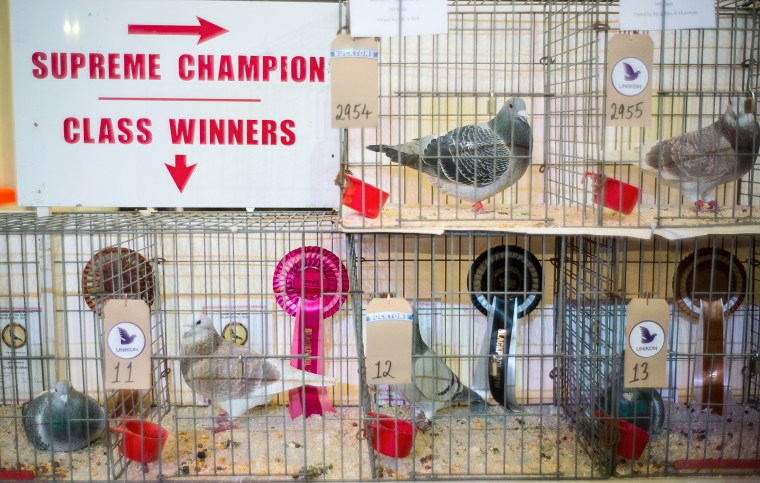
In general, pigeon races can be anywhere from 60 to 600 miles, Chambers said. The birds all start from the same point and fly back to their homes. Their speed is tracked by implanted chips and unique identification numbers, and the winning bird is determined not by the time of arrival but by air speed. The pigeon that flies fastest to its home wins.
Pigeon racing can include flying across international borders, and Belgium has become the unofficial capital of the sport.
It would make sense that the queen, a famously outdoorsy woman, would enjoy the sport.
“The joy is connection with birds, time spent in the fresh air, self-reflection,” Chambers said of the sport’s draw. “When the bird comes over the hills, over 600 miles, that’s a very satisfying feeling.”
Horses
Elizabeth’s fondness for horses was more well known. The queen’s first pony — a Shetland named Peggy — was given to her by her grandfather King George V when she was still a young princess.
Horse racing — aptly dubbed the sport of kings — was also a lifelong passion for the queen.
In June 1954, a year after her coronation, her horse, Landau, won the Rous Memorial Stakes and her stallion, Aureole, won the Hardwicke Stakes, according to the royal family’s official website.
Three years later, the queen had four winners during Ascot week and, in 2013, she became the first reigning monarch to win the Royal Ascot’s Gold Cup with her thoroughbred, Estimate.
Her success in the sport extended her until after the end of her life. Two days after she died, a horse bred by the queen won a race in Baltimore, Reuters reported. West Newton, a 6-year-old gelding, rallied from sixth place to win by a half-length. It marked his fourth victory in 19 races.
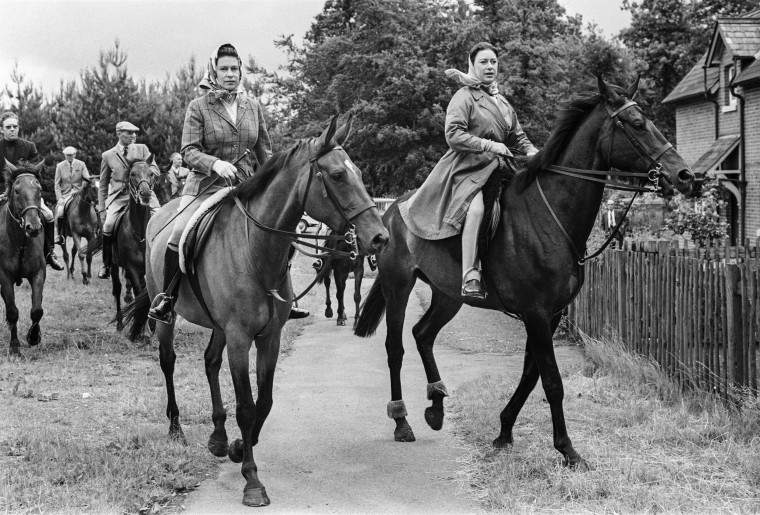
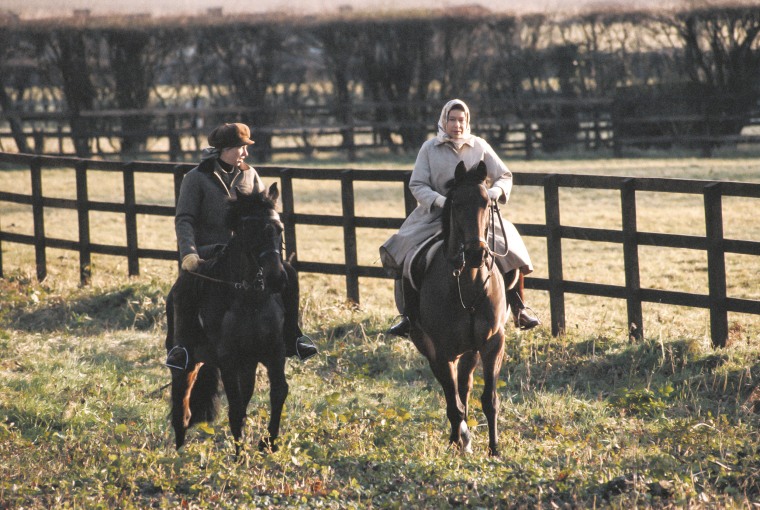
In June, French President Emmanuel Macron gave the queen a horse belonging to the French Republican Guard to mark her jubilee.
British horse racing paid tribute to Elizabeth on Sunday as the late monarch’s favorite sport returned after a two-day pause following her death.
Two minutes of silence was held at Doncaster before the first race of a schedule that included the St. Leger flat-racing classic, which the queen’s horse Dunfermline won in 1977 for one of her most prestigious victories.
“No one person ever has, or ever will, do so much for so long for horse racing, than did her majesty the queen,” narrator Brough Scott, a former jockey turned TV presenter, said during the video. “The sport worldwide will forever be in her debt.”
Swans
Perhaps one of the more unusual royal traditions is swan upping, an avian census conducted annually and dating back to the 12th century.
As queen, Elizabeth technically owned all mute swans in open British waters, and had the right to claim sturgeons, porpoises, whales and dolphins, according to a statute from 1324.
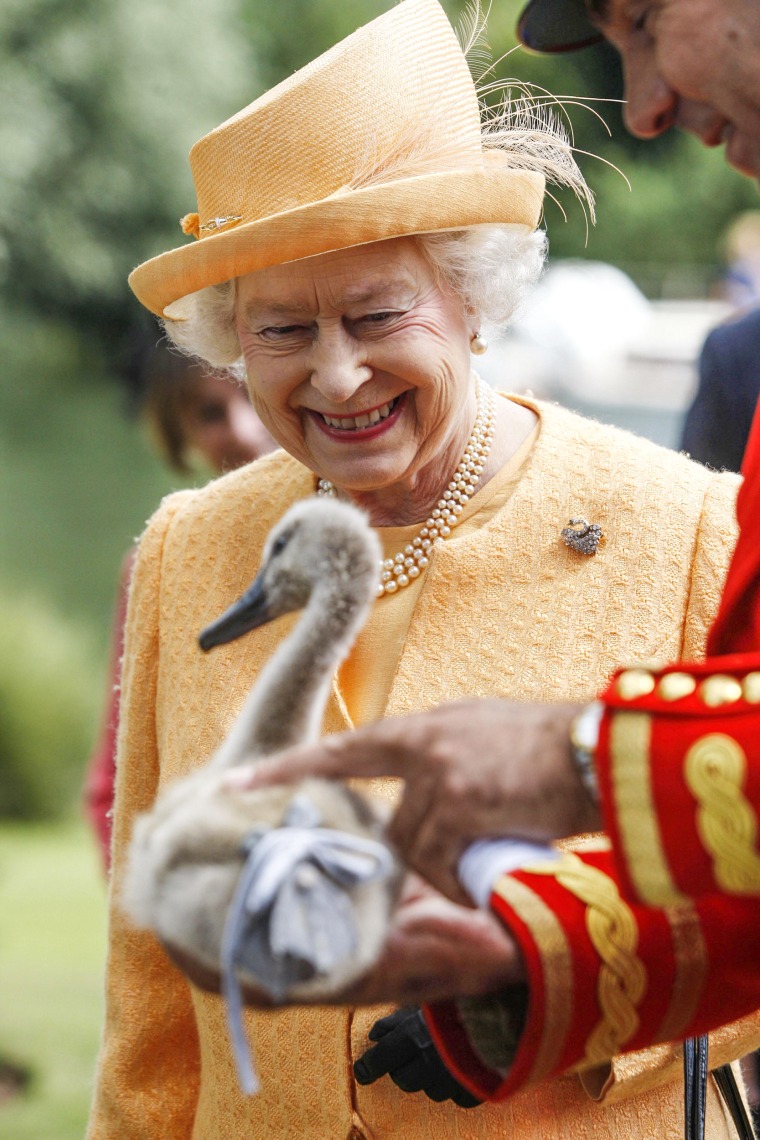
“Swans were a very, very important food, and they were served up at banquets and feasts,” David Barber, the queen’s Swan Marker, told Reuters during the 2021 swan upping. “Of course today, swan upping is all about conservation and education.”
According to the Royal Society for the Protection of Birds, a charity organization based in England, the ceremony continues in a largely symbolic form helpful in monitoring the condition and number of swans on the River Thames. Official swan uppers weigh and measure the cygnets and check them for any signs of injury, often caused by fishing hooks and line.
The most recent count was conducted in July.
Source: | This article originally belongs to Nbcnews.com


